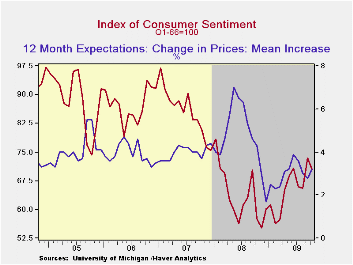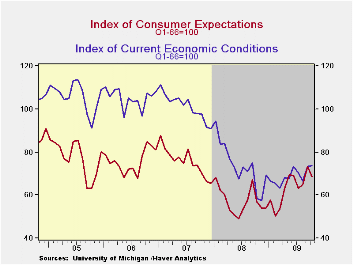 Global| Oct 30 2009
Global| Oct 30 2009Michigan Consumer Sentiment Improves From Mid-Month
by:Tom Moeller
|in:Economy in Brief
Summary
Consumer sentiment for all of October fell from September but the trend during the month improved. The University of Michigan indicated that its October reading of consumer sentiment of 70.6 was improved from the mid-month reading of [...]

Consumer sentiment for all of October fell from September but the trend during the month improved. The University of Michigan indicated that its October reading of consumer sentiment of 70.6 was improved from the mid-month reading of 69.4 but both figures were down from a September figure of 73.5. Despite the latest decline, sentiment remained up by roughly one-quarter from the low last fall. Consensus expectations had been for a full-month figure of 70. During the last ten years, there has been a 69% correlation between the level of sentiment and the growth in real consumer spending during the next five months.
The October reading of expected economic conditions fell a sharp 6.7% m/m. It was shallower-than reported at mid-month but still erased much of September's gain. The latest decline was led by a 16.5% drop in expected business conditions during the next five years which reversed much of the improvement since July. Expected conditions during the next year fell just modestly and the index remained more-than-double the February low. Conversely, the expected change in personal finances improved slightly with the index rising nearly one-quarter from the low during 2008 with the higher stock market.
The reading of current economic conditions increased moderately. The readings of personal finances and of buying conditions for large household goods held steady m/m, but the latter was up by one-third from the November trough due to low prices.
Expected price inflation during the next year amounted to 3.2%, up slightly from September but down from a high of 7.0% during May of last year. A low of 0.3% inflation was expected by 25% of respondents but 5.0% inflation was expected by another quarter. Inflation of 3.2% during the next 5-10 years was the mean expectation.
The opinion of government policy, which may eventually influence economic expectations, fell from September and remained near the lowest level since February. Thirty-two percent of respondents thought that a poor job was being done by government. A reduced 18% thought that a good job was being done, down from 30% in April.
The University of Michigan survey data is not seasonally adjusted. The reading is based on telephone interviews with about 500 households at month-end. These results are based on about 300 interviews. The summary indexes are in Haver's USECON database with details in the proprietary UMSCA database.
Optimism Amid Uncertainty from the Federal Reserve Bank of Dallas is available here.
| University of Michigan | October (Final) | Mid-October | September | August | Oct y/y | 2008 | 2007 | 2006 |
|---|---|---|---|---|---|---|---|---|
| Consumer Sentiment | 70.6 | 69.4 | 73.5 | 65.7 | 22.6% | 63.8 | 85.6 | 87.3 |
| Current Conditions | 73.7 | 72.1 | 73.4 | 66.6 | 26.2 | 73.7 | 101.2 | 105.1 |
| Expectations | 68.6 | 67.6 | 73.5 | 65.0 | 20.4 | 57.3 | 75.6 | 75.9 |
Tom Moeller
AuthorMore in Author Profile »Prior to joining Haver Analytics in 2000, Mr. Moeller worked as the Economist at Chancellor Capital Management from 1985 to 1999. There, he developed comprehensive economic forecasts and interpreted economic data for equity and fixed income portfolio managers. Also at Chancellor, Mr. Moeller worked as an equity analyst and was responsible for researching and rating companies in the economically sensitive automobile and housing industries for investment in Chancellor’s equity portfolio. Prior to joining Chancellor, Mr. Moeller was an Economist at Citibank from 1979 to 1984. He also analyzed pricing behavior in the metals industry for the Council on Wage and Price Stability in Washington, D.C. In 1999, Mr. Moeller received the award for most accurate forecast from the Forecasters' Club of New York. From 1990 to 1992 he was President of the New York Association for Business Economists. Mr. Moeller earned an M.B.A. in Finance from Fordham University, where he graduated in 1987. He holds a Bachelor of Arts in Economics from George Washington University.
More Economy in Brief
 Global| Feb 05 2026
Global| Feb 05 2026Charts of the Week: Balanced Policy, Resilient Data and AI Narratives
by:Andrew Cates






